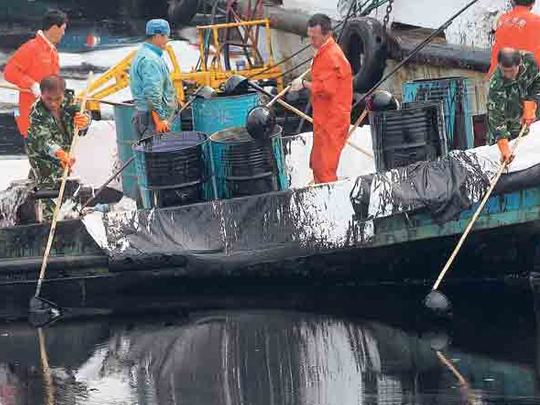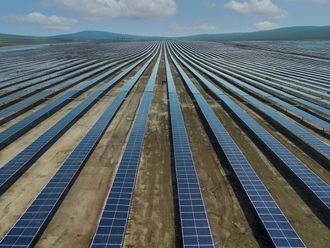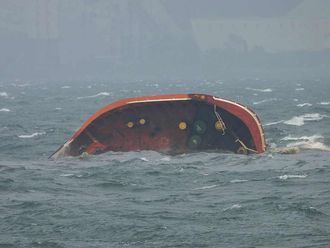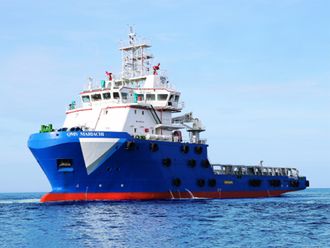
Hong Kong: PetroChina Co, the world's second-largest company by market value, said an oil spill caused by pipeline blasts at Dalian port in northeastern China has been contained by floating barriers and the cleanup is under way.
"The most important thing now is to clean up the area," Mao Zefeng, spokesman for the Beijing-based company, said by telephone from Hong Kong today. "We are looking at the extent of the damage to the pipelines, but we think any effect is limited in scale."
An incorrect procedure during the offloading of a tanker may have led to the July 16 explosion that damaged two pipelines and spilled oil into the Yellow Sea, Mao said. The cause is yet to be confirmed and an investigation is underway, he said. The oil port was closed after the blasts, said an official at one of PetroChina's two refineries at Dalian, who can't be named because he isn't authorised to speak to the media.
Dalian Port (PDA) Co, operator of China's largest crude oil terminal, fell the most in two months in Hong Kong trading after the explosions caused what may be the biggest spill in the country's seas. The government of Liaoning province, where the harbour is located, has set up a taskforce to deal with the spill, the Ministry of Agriculture said on its website.
Dalian Port declined 5.1 per cent, the biggest drop since May 19, to close at HK$3 in Hong Kong. Petro-China, a unit of the country's largest oil company, fell 1.4 per cent to HK$8.46 while the benchmark Hang Seng index lost 0.8 percent.
The pipeline blasts occurred a day after BP Plc capped its Gulf of Mexico leak and followed a Dec. 30 diesel fuel spill from a pipeline operated by PetroChina's parent that polluted the Yellow River. The slick is as thick as 10 centimetres, the state-run China Central Television reported yesterday.
About 1,500 tonnes of oil has spilled into the sea, according to China National Radio. BP's well spewed as much as 60,000 barrels of oil a day, or 8,220 tonnes daily, since an April 20 rig explosion until it was capped July 15, according to a US government-led panel of scientists.
Seriously polluted
"It doesn't compare in terms of size or seriousness with the BP oil spill," Grace Liu, analyst at Guotai Junan Securities Co., said by phone from Shenzhen.
The blast has "seriously" polluted 11 square kilometres of sea and "slightly" affected 50 square kilometres, the official Xinhua News Agency reported yesterday, citing Wu Guogong, deputy chief of the municipal environmental protection bureau.
The spill is the biggest in Chinese waters and could have a long-term impact on the marine ecology of the area, Yang Ailun, a Beijing-based spokeswoman at Greenpeace, said by phone today. "This incident and the one at the Mexican Gulf have revealed the risks of economies being over-reliant on dirty energy."
Hundreds of staff from PetroChina's state-owned parent, China National Petroleum Corp, are working with local and central government agencies to remove the oil, Mao said.
Massive operation
More than 20 vessels have been deployed to spray chemicals and a seven-kilometre barrier has been set up to contain the spill, which may take two weeks to clean up, China National Radio said, citing Huang Yong, deputy chief of Dalian city's Maritime Safety Administration. The port is capable of handling 57 million tonnes of crude annually, according to the website of its parent, PDA Corp.
Two fishery companies, Dalian Yi Qiao Marine Seeds Co. and Dalian Zhangzidao Fishery Group Co, said in filings to the Shenzhen Stock Exchange yesterday the spill was far from their farming areas and hadn't affected products.
"Dalian is one of China's most important seafood production regions, so we need to assess if fishing products will be suitable for consumption for quite a long time to come," Yang of Greenpeace said.
An oil pipeline exploded late on July 16 near Dalian's Xingang Harbour, causing a smaller pipeline nearby to also explode, according to Xinhua. The fire was mostly extinguished by July 17, 15 hours after the initial blast, Xinhua said.
Six tankers to be diverted
As many as six very large crude carriers (VLCCs), or 12 million barrels of crude oil, are set to be diverted from the Dalian port in northeast China after explosions at oil pipelines shut the terminal, shipping sources said yesterday.
The new destinations for these vessels were still unclear, but they could include other ports in China or nearby South Korea, they said. China has another half dozen crude terminals to receive VLCCs.
The Dalian Xingang oil port is a major source of crude oil imports to PetroChina's northeastern refineries.
The VLCC Cosmic Jewel, chartered by the Chinese oil major, has halted discharging crude after the incident, trade sources said.












